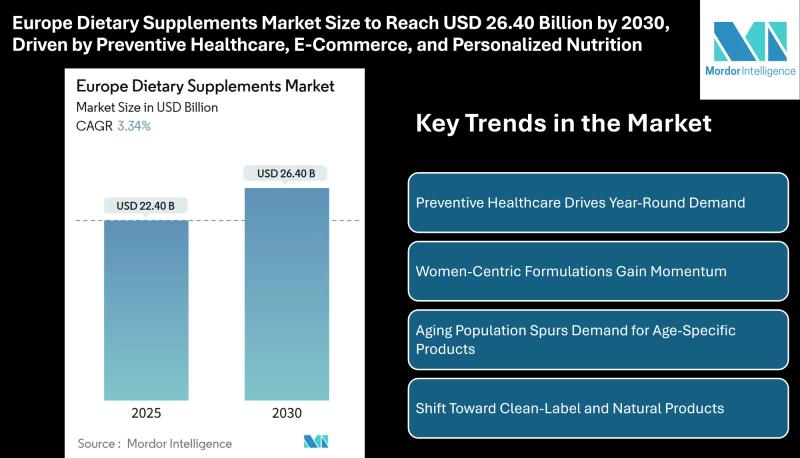The European dietary supplements market is experiencing robust expansion, projected to reach USD 26.40 billion by 2030, driven by a confluence of significant factors reshaping consumer behavior and market dynamics. This substantial market growth 2030 is primarily fueled by a heightened emphasis on preventive healthcare, the explosive rise of e-commerce health platforms, and a surging demand for personalized nutrition solutions tailored to individual needs.
A profound shift towards preventive healthcare is underpinning the steady demand for dietary supplements across Europe. Consumers are increasingly integrating these products into their daily routines, moving away from seasonal use to consistent year-round consumption. Countries like Germany and France are actively promoting nutritional screening and immunity-focused supplementation, with key players expanding their offerings to meet this sustained demand for daily-use, evidence-backed formulations.
Demographic shifts are also pivotal in propelling the market forward, particularly among women and the aging population. Women represent the largest consumer segment, driving demand for specialized dietary supplements Europe focused on fertility, hormonal balance, and beauty-from-within. Simultaneously, Europe’s growing elderly population is boosting the need for age-specific products targeting bone density, cognitive function, and cardiovascular health, with brands investing heavily in clinical validation to build trust with this discerning group.
Consumer preferences are visibly shifting towards clean-label and natural products, with plant-based ingredients gaining significant traction due to their perceived safety and sustainability. This trend is influencing product development, leading companies to adopt new dosage forms and transparent labeling technologies. Ingredient traceability and locally sourced botanicals are emerging as key differentiators, especially in Northern and Western Europe, reflecting a broader consumer desire for transparency and ethical sourcing in nutritional trends.
Analyzing market segmentation reveals that vitamins continue to dominate by product type, while prebiotics and probiotics are poised for rapid growth, driven by increasing awareness of gut health benefits. Tablets remain the most popular form due to stability and ease of dosage, though gummies are rapidly gaining favor. Synthetic/fermentation-derived ingredients lead by source, but plant-based supplements are expanding quickly, aligning with vegan nutritional trends and sustainability goals.
Distribution channels are evolving, with online retail emerging as the fastest-growing segment, offering unparalleled convenience and product variety. This expansion of e-commerce health platforms provides faster accessibility to a wide array of supplements. Additionally, traditional pharmacies and direct-selling models are adapting by incorporating personalized consultation services, further enhancing consumer access and engagement within the dietary supplements Europe landscape.
The competitive landscape is moderately fragmented, featuring a mix of multinational corporations and regional specialists. Leading players such as Bayer AG and Procter & Gamble leverage their scale and R&D capabilities, while others like Vitabiotics focus on niche segments for targeted growth. Mergers, acquisitions, and the rise of direct-to-consumer models powered by AI-driven nutrition assessments are reshaping the industry, emphasizing tailored solutions and scientific backing to gain a competitive edge.
In conclusion, the Europe Dietary Supplements Market is set for substantial and steady growth through 2030, underpinned by increasing awareness of preventive healthcare, evolving personalized nutrition demands, and a strong preference for clean-label products. Strategic focus on science-backed ingredients, sustainable sourcing, and tailored solutions will be crucial for market players. The expanding reach of e-commerce health and robust regulatory frameworks further solidify a trustworthy and accessible market, ensuring continued market growth 2030 across the region, particularly in fast-developing areas like Poland.






Leave a Reply